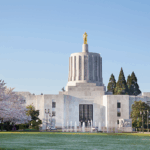(LITTLE ROCK, Ark.) – Just weeks after passing the largest education reform in state history, Arkansas lawmakers are now considering a bill that would better protect both taxpayers and teachers in the Natural state by preventing government employers from deducting union dues or political contributions from public school employees’ paychecks.
“Gov. Sarah Huckabee Sanders has taken major steps to make good on her promise to be the education governor that others should aspire to,” said Rusty Brown, southern director for the Freedom Foundation. “The governor has already signed into law the largest teacher salary increase in state history, moving Arkansas from having some of the lowest teacher salaries in the country to among the five highest in the nation. I defy any teachers’ union to show where they’ve done the same.”
Now the state is moving to make it easier for public school employees to stop paying unwanted union dues and keep that money in their own paychecks.
Senate Bill 473 would repeal state laws requiring government entities like school districts and the Arkansas Public Employees Retirement System to deduct union dues from payments to public school employees and retirees and would get the government out of the dues collection business by prohibiting public employers from deducting “dues, fees, or contributions from the pay of a teacher or classified employee on behalf of any professional or labor organization or political fund.”
Teachers’ union representatives oppose the measure.
“Unions’ opposition to a measure that is obviously great for Arkansas’ teachers begs the question of why the state should continue to carry the unions’ water,” Brown said. “Right now, the state of Arkansas is responsible for taking union dues directly out of teachers’ paychecks, ensuring the teachers never actually see that money and sending it to the unions so the union doesn’t even have to ask for payment because then they’d have to prove their membership is worth buying in the first place. This is wrong and it needs to end.”
Until 2018, government employees in nearly half the country could be required to join and/or fund a labor union as a condition of employment. On paper, that changed with the U.S. Supreme Court’s ruling in Janus v. AFSCME, which affirmed that compulsory unionization violates public employees’ First Amendment rights of free speech and association.
The ruling did not, however, prevent states from continuing to partner with unions by deducting dues and fees from those workers who purportedly join the union.
Unions around the country have relied on government-administered dues collection systems to implement a variety of coercive practices and anti-Janus workarounds, from imposing sharp limits on when dues cancellations can be submitted to forging employees’ signatures on dues deduction authorization forms.
Now, the governor and the Arkansas State Legislature are taking significant steps to bring the state into compliance with the Janus ruling as similar measures make their way through the legislatures of Oklahoma, Tennessee, Kentucky and Florida.
Ending government-administered dues collection won’t prevent public school employees from signing up for union membership and making their own arrangements for dues payment, but it will curb the worst union practices, give employees more control over their union membership, and prevent taxpayer-funded systems from being used to fundraise for one of the most powerful and divisive interest groups in the country.
“Despite the governor’s actions to invest in educators, the teachers’ unions have opposed her at every turn,” concluded Brown. “It is perhaps the best example spotlighting that what truly matters to the teachers’ unions is not the teachers, but the union itself.”








